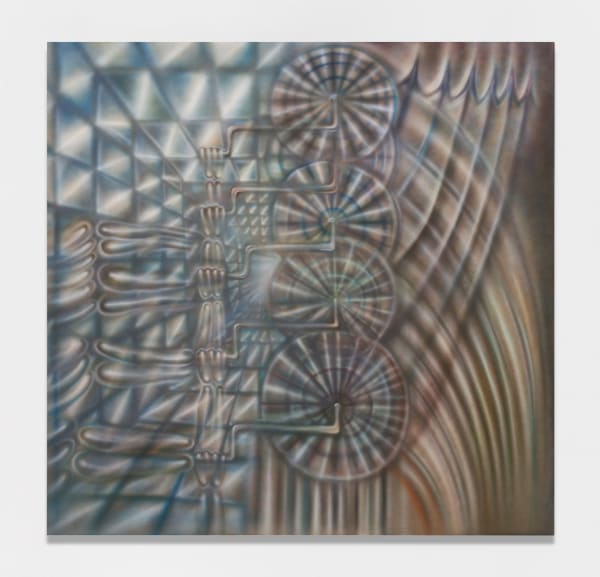Against the Grain Veronika Hapchenko
Mendes Wood DM New York
Mendes Wood DM is pleased to present the first exhibition of Poland-based Ukrainian artist Veronika Hapchenko in the United States. Hapchenko’s airbrushed canvases engage with themes of collective consciousness, as well as instances and manifestations of the occult. The works on view in Against the Grain form part of a series that originated in her interest in the mythological legacy of the Soviet engineering projects of the 1930s – in particular, the Northern River Reversal Project. Aimed at redirecting the outflow of Siberian rivers toward parched agricultural land in Kazakhstan, Uzbekistan, and Turkmenistan, this “megaproject” was one of the 20th century’s most ambitious engineering and construction endeavors.
In popular Soviet imagination, the plan to redirect the tributaries of Ob and Irtysh into the Aral Sea, evolved into a vision of the overreaching mechanical reversal of the empire’s system of rivers. Interested in the “distorted memory” of this historical episode, Hapchenko highlights how the Soviet Union is remembered as a totalitarian machine that aimed to “fix” man and earth, even reversing the flow of rivers – as if capable of reversing time itself – to show dominance over nature. Overlaying machine elements with human figures and charts, creating an illusion of depth and motion, Hapchenko’s works evoke a sense of rhythm or cyclical movement that corresponds to the Soviet initiative.
Expanding on the theme of humankind’s superiority over nature, the exhibition delves into the cultural memory of the persona of the Soviet engineer. A highly popular profession in the USSR, the engineer was seen as a creator of new worlds, a quintessential performer on the border between the working class and the intelligentsia, integral to the party’s propaganda narrative. Hapchenko’s series conjures memories of a time when Joseph Stalin addressed writers as “engineers of the soul” and when artists were expected to praise state infrastructure through their art.
In dialogue between tangible and spiritual forces, Hapchenko’s works juxtapose secular mechanisms of humanity’s selective interest in nature with esoteric forms. For example, engineer 3 (2024) portrays engineers as spiritual forces and force (2024) depicts synergy between souls and machines. Addressing spiritual matters through the lens of magic and the occult, her work uncovers the undercurrents of spiritual practices that permeated Soviet society, offering an alternative narrative to state-sanctioned ideology.
The exhibition maintains a thematic continuity with Hapchenko’s interest in the necessity and irrepressibility of magic in secular societies through the dual unity and fragility of the circle formed in children (2023). The work’s enchanting composition is reminiscent of the belief that widespread interest in magic in Soviet times generated a sense of psychic safety through feelings of belonging, echoing Polish anthropologist Bronisław Malinowski’s argument that magic is not a primitive form of science based on mistaken observations but rather a logical response to times of danger and uncertainty.
Veronika Hapchenko (b. 1995, Kyiv, Ukraine) lives and works in Kraków, Poland.
Hapchenko has a forthcoming exhibition at RODEO, Piraeus, Greece (2024). Her most recent solo exhibitions include Against the Grain, Mendes Wood DM, New York, USA (2024); Interloper, Import Export, Warsaw, Poland (2023); The Feminist Ukraine: a New Geopolitical Sisterhood, K1 KANAL-Centre Pompidou, Brussels, Belgium (2022); False Door, Import Export, Warsaw, Poland (2022); Cherchez le mage, Nanazenit, Warsaw, Poland (2021); Cherchez le mage, i gallery, Kraków, Poland (2021); and everything was beautiful and nothing hurt, Baszta Gallery, Dworek Białopradnicki Cultural Center, Kraków, Poland (2019).
Her works have also been included in group exhibitions, including Ruined, CONDO London, United Kingdom (2024); Mental Pictures, Import Export, Warsaw, Poland (2023); The Open World, Thailand Biennale, Chiang Rai, Thailand (2023); Primary Forms, curated by Helena Czernecka and Sebastian Cichocki, Museum of Modern Art in Warsaw, Poland (2023); Linhas Tortas, curated by Diana Campbell, Mendes Wood DM, São Paulo, Brazil (2023); CORPOREAL, curated by Valeria Schaefer Curina and Galleria Alessandro Albanese, Matera, Italy (2023); My Rhino is not a Myth, curated by Adrian Notz, Art Encounters Biennial, Timișoara, Romania (2023); Esfíngico Frontal, curated by Germano Dushá, Mendes Wood DM, São Paulo, Brazil (2023); Bonna, curated by Diana Campbell, Dhaka Art Summit, Dhaka, Bangladesh (2023); When Desire Becomes Home, Casa Filipka by Her Clique, Mexico City, Mexico (2023); Invisible Until It’s Broken, curated by Silke Schoenfeld, Künstlerhaus Dortmund, Germany (2023); Stany przejściowe, Galeria Bielska BWA, Bielsko-Biała, Poland (2023); Fidelio, Pałac Schaffgotschów, Wrocław, Poland (2023); Aurora nostri temporis, curated by Matylda Prus and Stach Szabłowski, BWA Tarnów, Tarnów, Poland (2022); Is it real? The power of imagination, Rondo Sztuki, Katowice, Poland (2022); Obywetele Kosmosu, Anton Vidokle and Veronika Hapchenko, Muzeum Sztuki, Łódź, Poland (2022); The Discomfort of Evening, curated by Magdalena Komornicka, Zachęta National Art Gallery, Warsaw, Poland (2022); Textures of the Contemporary, curated by Marlene Schenk and Valeria Schaefer, Renata Fabbri Arte Contemporanea, Milan, Italy (2022); among others.







